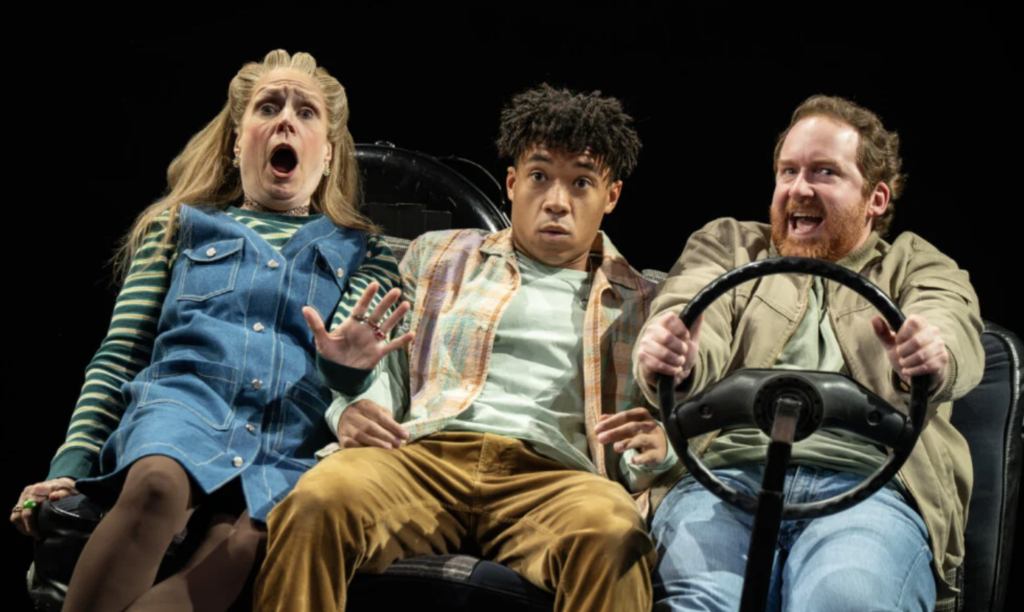MET finds comedy in murder, and UMKC finds something new in Dickens
Out on Blue Parkway, in a squat, sorry building that looks like a carpet store, there’s a club named Funky Town. Inside hangs a cheesy glow-in-the-dark cityscape. The highlight of any night blown dancing in this silliest of places: When “Funkytown” plays, those cartoon buildings are rigged to dance.
Why do I bring this up? As my eyes tried to make sense of the New York City set that Metropolitan Ensemble Theatre has erected for its crowd-pleasing detective musical No Way to Treat a Lady, all I could think was, This looks like MET hired Funkytown.
Unfortunately, this New York doesn’t dance. Thankfully, Jon Daugharthy and Jeanne Averill do, as murderer and murderee in several wicked duets that play, with welcome wit and cruelty, on the notion of the ladykiller.
Daugharthy plays Christopher Gill, a struggling actor who turns to murder to get himself into the papers. Averill plays a morgueful of his victims — an r-rolling salsa queen, a sauced party girl — and demanding mothers: the killer’s grande dame and the detective’s Jewish stereotype. A one-woman vaudeville troupe, she displays stellar timing and many comic accents and the ability to find the laugh in even the hoariest kvetch. Daugharthy is also strong.
The script lets these actors play, but Daugharthy is ill-served by its repetitions. At first, he and director John Staniunas balance the dark comedy with even darker glimpses of Gill’s twisted psychology. Unfortunately, there’s little meaningful escalation in the many scenes of Gill mooning madly in his apartment. After his first impressive eye-pops and sputters, Daugharthy has little to do the next time but eye-pop and sputter harder.
Musical director Jeremy Watson leads a piano-and-drums ensemble that mostly clicks. The upbeat numbers bounce memorably, the wistful ones pass pleasantly, and the anxious and violent ones are somewhat mangled. Walking out afterward, I remembered less about the music and more about Georgianna Londré’s spectacular costumes. Londré revels in the period setting, unleashing the most smashing of 1960s dresses since Late Night Theatre folded.
Writer Douglas Cohen and director Staniunas get laughs by juxtaposing courtship and murder, but by the second act, relationship travails have gummed up the momentum. Both director and author have a surer hand on the comedy than on the pathos. They rally at the end — even though you can see it coming an act away, it’s staged with enough savvy that the tension seized me up. This was a relief because during the dead patches, I spent too much time wondering how much work it would take to make those buildings leap up and dance.
Here’s what I wondered during the often-inspired current production of Great Expectations, from UMKC’s graduate theatre department: Would this adaptation by Neil Bartlett conclude with Dickens’ bleak original or the upbeat, impossible happily-ever-after ending that he appended just before publication? I won’t spoil with an answer, but I will marvel at Bartlett and director Lucy Maycock’s surprise opening: a conflagration, projected over a set of black, dreary Dickensian doorways, and narrator Pip (Nick Gehlfuss) not getting to the famous first line for a couple of minutes.
The adult Pip shares the stage with the young Pip, played by Dina Kirschenbaum. They’re a tag team through the familiar story, Gehlfuss narrating and (at first) Kirschenbaum acting it out. They craft an affecting hero, a boy who is raw, eager, childish, afraid and quickly shaped before our eyes. Given choice bits of Dickens to recite, Gehlfuss rises to the occasion, demonstrating rare ease and command.
Maycock unleashes spook-house effects (some work and some don’t) and often sends a Victorian chorus bustling through (sometimes to powerful effect and sometimes distractingly). Much of the show zips past us in near montage, events piled atop one another, but Maycock is generally adept at movement, meaning and time (at least until a climactic muddle on a river). Rachel Hirshorn is suitably aristocratic but broken as Miss Havisham. As lawyer Jaggers, Zachary M. Andrews is all stony integrity.
As always, Great Expectations wears on a bit. What Pip does once he is established is less interesting than his attempts to become so, and the third act lacks the beauty and pain of the opening. Still, the final moment — that surprise — is a superb, clear-eyed look at how adults endure even after expectations have been dashed.
Click here to write a letter to the editor.




